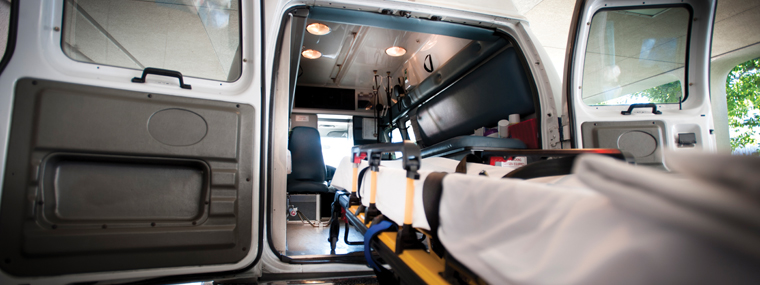
Seven Reasons 911 Should Not Be Your First Emergency Call
By Katie Thomas / Published October 2017
First, hats off to all 911 operators—well, except for that gal in Houston, Texas, in 2016 (Full story here: http://cnn.it/2ewHGOQ). No hats for her, just handcuffs. Being an emergency operator can be a thankless job, one where your ‘customers’ are glad you answered the call, but they’re never happy they had to make the call in the first place. This isn’t a bash session on 911 call centers, but simply an effort to highlight some of the hurdles they face and why, although considered the ‘go to’ in emergency response, 911 may not always be the best direct dial option. See why below.
Also, prepare your property for emergencies with this free Emergency Action Plan download: http://bit.ly/2s4lcL7.
1. Response time
It’s become a regular occurrence whereby delayed 911 response time makes headline news. Don’t believe me? Earlier this year, during a bank robbery, more than 180 calls were placed on hold with 911 for more than eight minutes. Also this year, one city’s 911 center alone reported having more than 360 calls on hold at one point resulting from an ongoing issue the city refers to as ghost calls.
2. Underfunded
Emergency 911 centers are historically underfunded, taking in more calls as populations grow without additional funding to ramp up emergency operator headcount and monitoring center technology. Of course, dispatch shortages lead to slower response times.
3. Abuse
As if underfunding coupled with population growth weren’t enough, city 911 centers are also becoming abused more frequently. Abused? Yes, abused. As the security industry continues to grow and new innovative services hit the market, you can find in the details of these services the abuse I speak of. Does your home security app show you that someone you don’t know is on your doorstep? (So what, by the way.) No worries, 911 will dispatch police, or at least that’s what commercials would lead you to believe. New safety app on your phone? Assuming you can activate the alarm before being attacked, don’t fret; it rings direct to 911 and help is on the way.
More than 95 percent of alarms are false. Imagine how this volume of false calls ties up valuable call time that is already on short supply. The abuse will be addressed eventually; of that I have no doubt. There is simply no scenario where these overworked and underfunded centers do not eventually take a stand that says, “No, business xyz, you cannot sell a solution that realizes a profit off the backs of a labor force that is not yours.” And yet, I digress. It’s coming, though.
4. Location identification
Have you ever dialed 911 from a cell phone? Did your local monitoring center run the same ‘Help Us Help You’ campaign that mine did, solely focused on making certain you know where you are and are notifying 911 at the onset of your call? It’s an unfortunate situation. Your cell phone pings the closest tower, which sometimes happens to be incongruent with your location address/municipality and rings to the incorrect 911 center, delaying the response and sometimes contributing to fatal consequences. What’s more is that callers are panicked, and even if they are aware of their exact location, they may have trouble communicating that during an emergency.
5. False call fines
If you’re a multifamily or commercial property manager and you have multiple false calls to 911, many municipalities charge false call fines.
6. Unnecessary damage
Okay, so this is specialized, but think elevators here. If you have an elevator phone and it’s ringing directly to 911, I can guarantee 911 is not calling to dispatch your elevator maintenance company. They don’t even know who your elevator service company is. They’re calling the fire department. What’s the fire department doing when they arrive at your location? Likely, damaging your elevator doors. They have a job to do and preserving your property is simply not a priority. What does the typical damage to an elevator door run you? More than you want to shell out, and it’s unbudgeted to boot.
7. Out of the loop
If you have a help phone on your property ringing directly to 911, you’re not going to be looped in the same way you should be with a specialized monitoring solution. If your phones are monitored by a third party, this is where you start to go back and review the value they provide. Are they keeping you informed? The nightly news, YouTube, or Facebook may be the first time you hear about what happened under your nose. These are the worst kinds of surprises, particularly if they hit your boss’s desk or corporate before they make their way to you.
911 needs help, and so do your communities
The answer for both: dedicated call centers. The appropriate emergency monitoring center really depends on the use, but one thing is clear: 911 needs help. They need specialized emergency monitoring centers to screen calls and help identify and relay verified alarms. But why would I want to go through a middle man monitoring company before reaching 911? Pre-identifying verified alarms gives specialized emergency dispatch centers a spot in the express line to reach an operator to dispatch local authorities, should that be needed. They are not going through the same call channel that you or I would personally if we dialed 911.
Look for a dedicated emergency call center for your community that ensures that alarms have been verified via audio and are treated differently than a standard incoming call as a result. The other plus: these call centers have more time with each caller, and, if you choose a dedicated center with trained operators, they can stay on the phone and provide medical and emergency instructions while help is on its way. Finally, they’ll report back to you. If a 911 call comes from a resident, it is likely that property staff will never even know that the call took place. Dedicated call centers not only dispatch the correct help, but they notify property management of the situation, something absolutely essential for property safety.
The bottom line here is that in a community association, relying on 911 for emergency response simply isn’t enough. You are liable for property and resident safety. These shortcomings with 911 call centers highlight the need that communities have for well-thought out emergency response plans. Plan accordingly.
Katie Thomas
Vice President of Marketing at Kings III Emergency Communications
Katie Thomas is the VP of Marketing at Kings III Emergency Communications. Kings III is the nation’s only full-service provider of emergency communication solutions and has installed thousands of emergency phones throughout the United States and Canada. Kings III is fully integrated; they not only engineer and manufacture emergency phones, but they also provide one-stop-shop solutions that include installation, maintenance, and 24/7 emergency monitoring for emergency help phones utilized at poolside, in elevators, parking areas, stairwells, and more. For more information, visit www.kingsiii.com.



